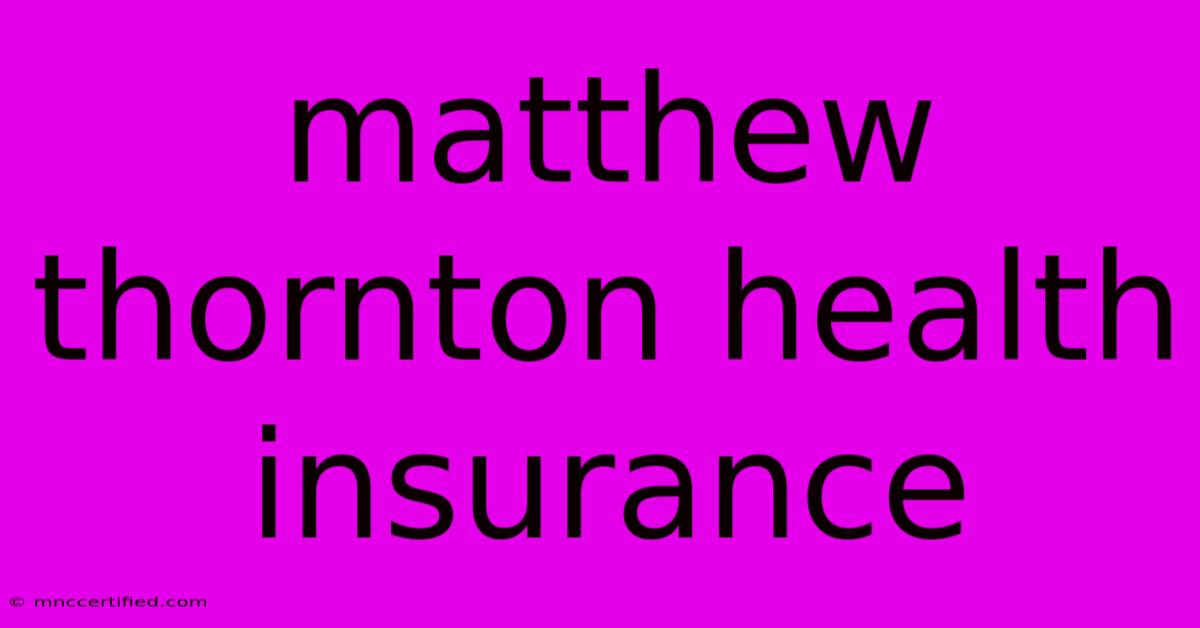Matthew Thornton Health Insurance

Table of Contents
Understanding Matthew Thornton Health Insurance Options
Finding the right health insurance can feel overwhelming, but understanding your options is the first step towards securing comprehensive coverage. This article focuses on navigating the landscape of health insurance, specifically addressing options potentially available to those seeking coverage under the Matthew Thornton Health Plan, a name commonly associated with New Hampshire's health insurance marketplace. We'll explore key aspects to consider, from understanding plan types to selecting the best coverage for your individual needs.
Decoding Health Insurance Terminology: A Quick Guide
Before diving into Matthew Thornton specifics, let's clarify some common terms:
- HMO (Health Maintenance Organization): Generally offers lower premiums but requires you to choose a primary care physician (PCP) within the network. Referrals are usually needed to see specialists.
- PPO (Preferred Provider Organization): Typically offers more flexibility with higher premiums. You can see specialists without referrals, and you have access to a wider network of providers, including out-of-network options (though at a higher cost).
- EPO (Exclusive Provider Organization): Similar to an HMO, but you don't need a PCP referral to see specialists, as long as they are in-network. Out-of-network care is generally not covered.
- POS (Point of Service): Combines elements of HMO and PPO plans. You typically choose a PCP, but have the option to see out-of-network providers for a higher cost.
- Deductible: The amount you pay out-of-pocket before your insurance coverage kicks in.
- Copay: A fixed amount you pay for a doctor's visit or other medical services.
- Coinsurance: Your share of the costs of a covered healthcare service, calculated as a percentage (e.g., 20%) after you've met your deductible.
- Premium: Your monthly payment for health insurance coverage.
Navigating the New Hampshire Health Insurance Marketplace
While the term "Matthew Thornton Health Plan" might be used informally, it's crucial to understand that it doesn't refer to a specific insurance company. Instead, it often refers to plans offered through the New Hampshire Health Insurance Marketplace, also known as the HealthCare.gov marketplace in New Hampshire. This marketplace offers a range of plans from various insurance providers.
To find suitable coverage, you'll need to:
- Visit the HealthCare.gov website: This is the official website for accessing health insurance options in New Hampshire and across the United States.
- Create an account: Provide necessary information to determine your eligibility and access available plans.
- Review plan options: Compare plans based on premiums, deductibles, copays, networks, and covered services. Consider your healthcare needs and budget when making your selection.
- Enroll in a plan: Once you've chosen a plan, complete the enrollment process.
Factors to Consider When Choosing a Plan
Several factors should guide your decision:
- Your budget: Premiums, deductibles, copays, and coinsurance all contribute to the overall cost of your healthcare.
- Your health needs: Consider pre-existing conditions, anticipated medical expenses, and the types of specialists you may need to see.
- Your preferred doctors and hospitals: Ensure your chosen plan includes your preferred providers within its network.
- Your prescription drug needs: Check the formulary (list of covered medications) to ensure your necessary medications are included.
Finding Additional Resources
For further assistance in navigating the New Hampshire health insurance landscape, consider contacting:
- Healthcare.gov: The official website provides comprehensive information and resources.
- New Hampshire Department of Insurance: This state agency can answer questions and provide guidance on insurance matters.
- A licensed insurance agent: An agent can help you compare plans and choose the best option for your individual circumstances.
Disclaimer: This information is for general guidance only and does not constitute financial or medical advice. Always consult with qualified professionals for personalized advice. The availability and specifics of health insurance plans are subject to change. It is crucial to verify information directly with the relevant insurance providers and government agencies.

Thank you for visiting our website wich cover about Matthew Thornton Health Insurance. We hope the information provided has been useful to you. Feel free to contact us if you have any questions or need further assistance. See you next time and dont miss to bookmark.
Featured Posts
-
Prophecy Dune Episode 1 Easter Eggs
Nov 19, 2024
-
Flintshire Wrexham School Closures Confirmed
Nov 19, 2024
-
Securian Evidence Of Insurability
Nov 19, 2024
-
Can You Reopen An Insurance Claim
Nov 19, 2024
-
Liechtenstein San Marino Prediction And Lineups
Nov 19, 2024